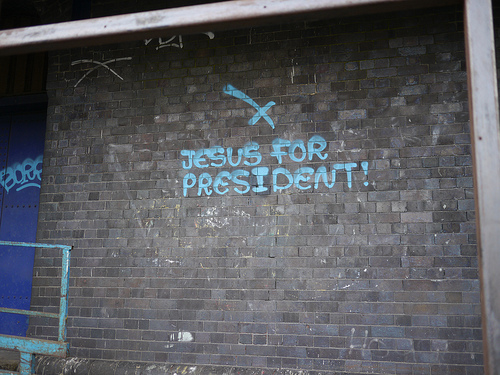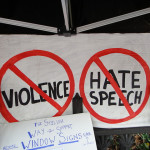We run our website the way we wished the whole internet worked: we provide high quality original content with no ads. We are funded solely by your direct support. Please consider supporting this project.

12 Reasons for Keeping the Kingdom of God Separate from Politics, Part 2
Image by the justified sinner via Flickr
- Satan is the “god of this age” (2 Cor 4:4) and “ruler of the world (Jn 12:30; 14:31) who “controls the entire world” (1 Jn 5;19) and possesses all the power of “all the kingdoms of the world” (Lk 4:6). While governments are ordained by God to preserve law, order, and justice (Rom 13), and while some governments do this better than others, kingdom people must always know that there’s a demonic element also at work in all governments and thus must take great care to keep the kingdom of God distinct from all of them.
- Among Jesus’ followers was a tax collector (ultra “right wing”) and a zealot (ultra “left wing”). Yet Jesus never once comments on either of their views, thereby revealing that such political differences are irrelevant to the alternative kingdom Jesus came to establish. When Christians today associate one political party or nationalistic agenda more closely with the kingdom of God than others, we compromise the separateness (the “holiness”) of the kingdom of God and then inevitably divide the body of Christ.
- Christians are called to be soldiers for the kingdom of God and thus not to be “entangled in everyday affairs” (e.g. the politics of the region where we’re stationed as soldiers). We are rather to seek “to please our enlisting officer” (2 Tim 2:4), Jesus Christ, who calls us to do nothing more or less than imitate him in his loving service to people as a witness to the alternative kingdom he was establishing in the world. Our witness is our willingness to serve and suffer for people whose lifestyle we may object to and even people who may despise us.
- Without exception, whenever the Church as succeeded in gaining what so many Christians try to acquire—political influence—it has resulted in a government that is bloodier than most secular governments. If Scripture is not sufficient to teach us to keep the kingdom of God completely separate from the politics of the world, history should be!
- Whenever the Church succeeded in gaining political influence, it has eventually all but destroyed the Church. All the areas once “ruled” by Christians are now more pagan and hostile to the Gospel than unreached areas (Europe for example). This is not an accident, for the Church is called to be a servant, not a master, of the world.
- The association of Christianity with political and nationalistic agendas has caused untold harm for missions around the world. Many today understandably resist the Gospel because they associate it with atrocities committed by countries identified as Christian in the past (e.g. Europe) or the present (America). For the sake of the Gospel, kingdom people need to proclaim that neither America nor any other country is or ever was “Christian.” The kingdom Jesus came to establish, and the kingdom we’re called to represent, is “not of this world” (Jn 18:36).
Category: General
Tags: Kingdom, Kingdom Living, Politics
Topics: Ethical, Cultural and Political Issues
Related Reading

Don’t Wilberforce’s achievements refute your stance on the separation of faith and politics?
Question: William Wilberforce was a Christian whose passionate involvement in politics almost single-handedly brought an end to the slave trade in 19th century England. Don’t his achievements show the importance of Christians being involved in politics, thus refuting your contention that Christian’s should keep their faith and values separate from politics? Answer: First, while I…

“I’m Angry, Too”
A reader (thanks, Jen!) sent us this blog post by Rachel Pieh Jones, an ex-pat from Minnesota living in Djibouti. She has some incredibly insightful and sad thoughts about the hateful responses to the recent protests and threats going on in other countries (and our own). We hope that as Christians we can contribute thoughtful…

Watch Greg on CNN’s “God’s Warriors”
This video is a CNN.com video of Greg’s segment on God’s Warriors. Greg’s interview starts at 2:07. The following was taken from a post on Greg’s blog (August 24, 2007): Thoughts on “God’s Warriors” from “The Heretic” Hi folks, I and a bunch of friends just finished watching Christiane Amanpour’s CNN documentary entitled “God’s Christian…

Corrective Love
drp via Compfight Kathy Escobar posted the other day about providing “corrective experiences” to those who have been hurt in the past. How many of us have approached Christians with our wounds and have been offered more of the same instead of the love and acceptance we’re longing for? How beautiful it would be if…

Zombies
What would Halloween be without a post about zombies? Image by rachel a. k. Sourced via Flickr.

Happy vs. Holy
Rebecca Tekautz wrote a reflection on Relevant Online Magazine regarding the stark difference between pursuing happiness versus pursuing holiness. We’ve been conditioned by a consumeristic society to seek our own happiness above all else, and sometimes we fail to see how this collides with our call to pursue the life that Jesus has called us to.…
